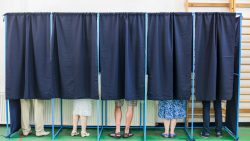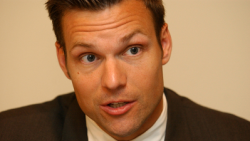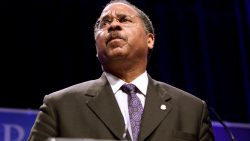Given that inflated claims about the threat of voter fraud are routinely used by right-wing officials to justify laws and policies that disenfranchise targeted groups of voters, it’s not surprising that this year’s Conservative Political Action Conference featured a panel on “The Threat of Stolen Elections: Protecting the Integrity of Elections.”
Also not surprising is that the panel was sponsored by the Heritage Foundation and led by the think tank’s Hans von Spakovsky, who served on the Trump administration’s bumbling and short-lived Commission on Election Integrity, which was seemingly convened by Trump to find evidence for his belief that it was only through massive illegal voting that he lost the popular vote in 2016.
Joining von Spakovsky on the CPAC panel were J. Christian Adams, who also served on that ill-fated commission, and conservative journalist John Fund, who has written books about voter fraud, including one he co-authored with von Spakovsky.
Von Spakovsky talked about the Heritage Foundation’s database, which he said contains more than 1,000 cases of election fraud. He said that one of the biggest problems in addressing election fraud is that “folks on the far left are opposed to absolutely anything that would improve the integrity of elections.” He called voter suppression a “mythical theme” of the left and complained that “states are not doing anything to verify that people who registered to vote are U.S. citizens.”
“If you want to see the grand plan of the left” to have the federal government “micromanaging” the administration of elections and “change the rules to ensure that cheating is easy and election integrity is damaged, just take a look at H.R. 1,” he said.
H.R. 1, introduced by the new Democratic majority in the House of Representatives, is a package of voting and democracy reforms that is backed by a broad nonpartisan coalition, including People For the American Way. Roll Call reported this week that “business and lobbying interests” have, at Senate Majority Leader Mitch McConnell’s urging, launched a “coordinated attack” against H.R. 1.
At CPAC, von Spakovsky said the bill would gut voter ID laws; require same-day registration, which he called “a recipe for fraud”; and take over states’ ability to make decisions on issues like redistricting. “Many parts of it are unconstitutional, and many other parts are frankly just bad, bad policy,” he claimed.
Adams, who heads an organization called the Public Interest Legal Foundation, said his group has been documenting evidence of the purported fraud by data-mining state records—for example, asking for records of all cancellations of voter registrations by non-citizens. The left, he said, is doing the same kind of things, but 10 times bigger. He blamed liberals, especially groups that challenged in court the legality of Trump’s commission, for its failure.
Adams told a story about a county in Mississippi where he said elections were “constantly being overturned” due to misuse of absentee ballots.
Adams said liberal activists oppose voter ID not because it’s hard for some people to get, but because “they think their constituency will lose it.” He said that voter ID is “yesterday’s issue,” saying “we’re way past it now, because the left has moved on.” The next “battle space,” he said, is “alien registration.” He said there is a “gigantic defect” in federal Motor Voter law that requires people to be offered the opportunity to register to vote when they get a driver’s license or are served by a social service agency. The form includes a citizenship checkbox. But, he said, “over and over and over again” his group has found forms of people who mark “no” on the citizenship question but get registered to vote anyway.
Adams recounted how in Texas, state officials claimed that they had found up to 95,000 people who might not be citizens on voter rolls—only to be stymied in their investigation, he said, when “the left” filed lawsuits to stop Gov. Greg Abbott and state Attorney General Ken Paxton “from finding out how many aliens were on Texas voter rolls.” Left out of Adams’ retelling was the fact that those were bad numbers. Adams also failed to mention that Texas Secretary of State David Whitley has since apologized for sending out numbers that were erroneous and, in the words of the Texas Tribune, “mistakenly threw into question the eligibility of tens of thousands of U.S. citizens” and “sent counties lists of voters it knew very likely included naturalized citizens.”
Fund noted that former Rep. Claudia Tenney, R-N.Y., was in the room, calling her “a victim of voter fraud” in a district where, he said, there’s “an unusual alliance of corruption between local officials and Native America reservation leaders, who are not known for their punctilious integrity in elections.” Fund presented no evidence for his assertion. As a representative, Tenney promoted right-wing claims about voter fraud. In 2018, she narrowly lost her bid for re-election even though Trump and his son Eric campaigned for her. (Interesting aside: in 2016, the year she was elected to Congress, Tenney had slammed CPAC’s sponsor, the American Conservative Union, as “a disgrace” and “part of the failed Republican establishment” when they endorsed her opponent; a court threw out her charge of fraud against him.)
Fund told his audience that if they work on voter integrity, they should expect to be charged with racism and voter suppression. But, he claimed, the main victims of election fraud are people who live in cities that are poorly run by Democratic machines that crush reformers.
Fund also warned about states where Democrats have taken power and are passing voter-access legislation like same-day registration. He said fraudulent same-day registration was responsible for the election of Sen. Al Franken and therefore for the passage of Obamacare.
Yet Fund did draw some lines against certain dubious claims. In response to a question about Texas politician Laura Pressley—who challenged her loss in a 2014 race for Austin city council based on the voting machines used and other “irregularities”—Fund suggested that Pressley has an “overactive imagination.” And he warned people against other rumors that float around the right-wing internet that he said are not true, such as a conspiracy theory that George Soros had invested in companies that make electronic voting machines. Not everything they read on the internet is true, Fund reminded attendees.
Speaking of not believing everything you read, what about that Heritage Foundation database?
Last summer, the Washington Post’s Eli Rosenberg spoke to election experts and concluded that that the Heritage Foundation database, along with a voter-fraud study by a group founded by former White House strategist Stephen Bannon, provided “a window into the ways in which statistics are massaged and studies are selectively deployed in the push to address the supposed mass scourge of voter fraud with stricter voter identification laws.”
In 2017, the Brennan Center for Justice analyzed the Heritage database and said that it actually “undermines its claim of widespread voter fraud” and “confirms what numerous studies have consistently shown: Voter fraud is vanishingly rare, and impersonating a voter at the polls is less common a phenomenon than being struck by lightning.”
Note: Due to an error inadvertently introduced in the editing process, this post inaccurately characterized the nature of Laura Pressley’s election challenge. RWW regrets the error, which has been corrected.









